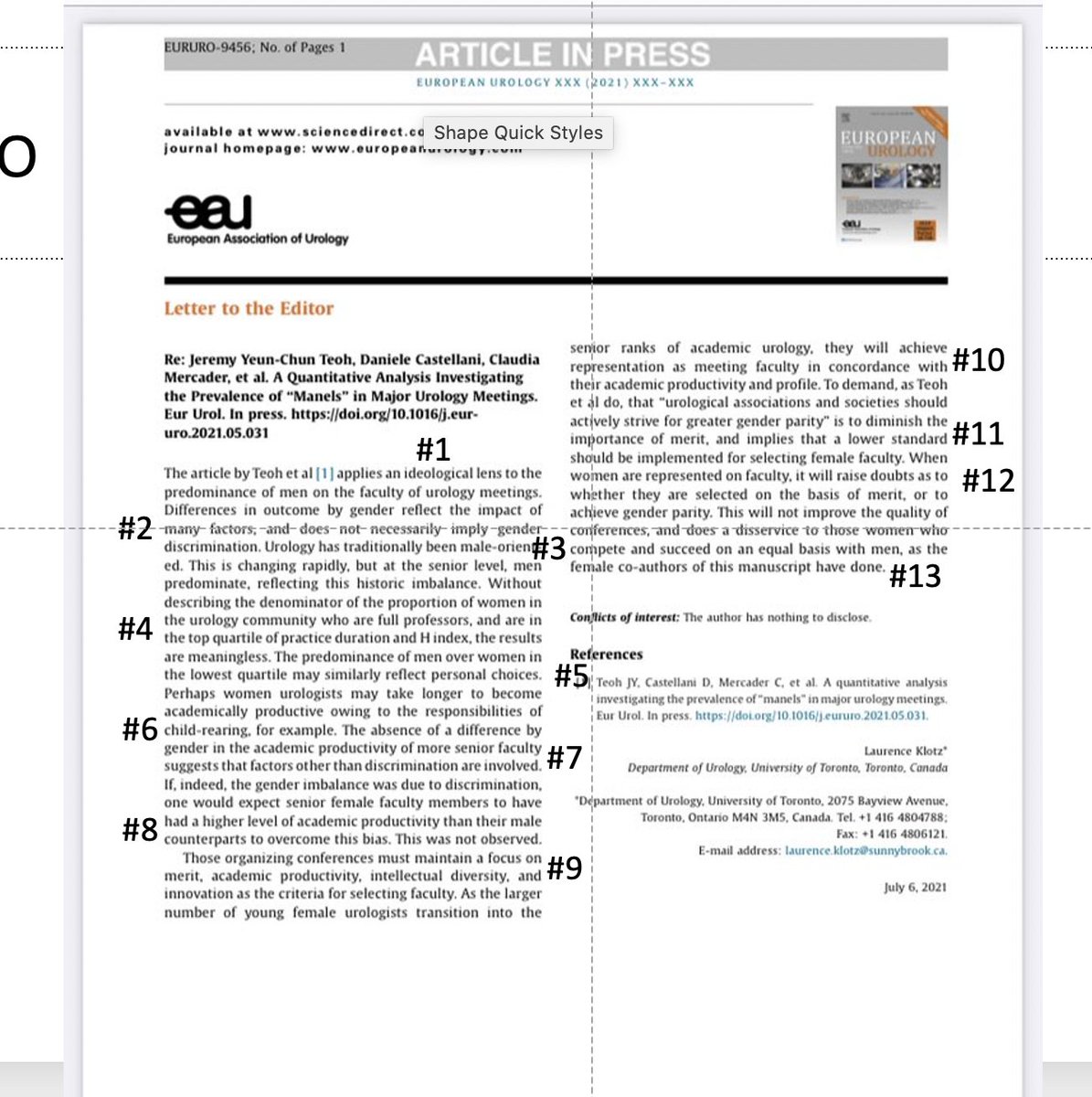
My point-by-point response to Dr. Klotz, who did us all a favor by putting his biased thinking out in the open.
Dear Dr. Klotz,
Thank you for demonstrating the challenging attitudes faced by women in medicine. Here are the flaws I see in your arguments.
1/
Dear Dr. Klotz,
Thank you for demonstrating the challenging attitudes faced by women in medicine. Here are the flaws I see in your arguments.
1/
https://twitter.com/LauraBukavinaMD/status/1430971005724409859

#1. Perhaps instead of “ideological” lens you mean the authors have some kind of agenda? That agenda seems to be helping women have the same access to opportunities as do men.
2/
2/

#2. People love to deny the existence of discrimination. This is especially true for those who are high up in the hierarchy because if you acknowledge widespread discrimination it may bring your own success into question.
3/
3/

In reality, acknowledging there is discrimination doesn’t invalidate your success. It’s just an acknowledgment that you likely have had different and fewer obstacles than other people, in this case women.
4/
4/

#3. I’m not sure what you mean about urology being “male-oriented.” Do you think it’s only appealing to/serving men? Both men and women have urologic problems. If the field is not welcoming to women, that is problematic for the field as a whole and especially for women patients. 

#4. Your basic argument is that we should control for variables that demonstrate gender bias. For example, why are women less likely than men to be full professors in urology? Certainly the pipeline (interest in urology) is part of the problem.
journals.lww.com/annalsofsurger…
journals.lww.com/annalsofsurger…
But even once women choose urology, other factors (including bias/discrimination) prevent them from getting promoted to professor. If you really want to examine this, your denominator should include the # of women who could have been part of the field but left.
7/
7/
#5. Yes, I guess by choosing to be, for example, a woman urologist rather than just a urologist, women "choose" to make less money. Also the work women do is reimbursed at lower rates so compensation is often lower because of that.
ncbi.nlm.nih.gov/pmc/articles/P…
8/
ncbi.nlm.nih.gov/pmc/articles/P…
8/
#6. We all know the burden of childcare and housework often falls disproportionately on women. Maybe this societal expectation is what you meant by “personal choice?”
ncbi.nlm.nih.gov/pmc/articles/P…
9/
ncbi.nlm.nih.gov/pmc/articles/P…
9/
#7 and #8. Again, if you look only at the women who remained, you may not see disparities. But what about all the ones who left because they would not or could not tolerate discrimination, harassment, and bias? You have to account for them as well.
10/
10/

#9. The myth of meritocracy is so damaging and actually allows discrimination to persist. Is it meritocracy when almost zero women are selected for society awards? Or when women’s research is less likely to be published and less likely to be cited?
nature.com/articles/d4158…
11/
nature.com/articles/d4158…
11/
#10. The whole pipeline argument again—if only we could get more women to go into urology, we would have more women in senior positions. Women have been >45% of med school classes since the late 1990s and we are still under-represented in academics and...
aamc.org/media/8661/dow…
aamc.org/media/8661/dow…
...among chairs/deans.
#11 and #12. The old diversity/excellence tradeoff argument. Actually, there is no evidence that valuing diversity leads to worse quality. It just allows the excellent candidates who don’t look like you to actually get a shot.
forbes.com/sites/paologau…
#11 and #12. The old diversity/excellence tradeoff argument. Actually, there is no evidence that valuing diversity leads to worse quality. It just allows the excellent candidates who don’t look like you to actually get a shot.
forbes.com/sites/paologau…
#13. Blaming the women is a common strategy to avoid taking responsibility for your role in maintaining a system that undervalues and undercompensates women. None of us wants to admit complicity in a discriminatory system, but indeed we are all part of it.
14/
14/

The sooner we admit that, the sooner we can change it.
In summary, I really appreciate you including so many flawed arguments in this letter so we could have the opportunity to confront them. Please keep writing!
Sincerely,
Arghavan Salles, MD, PhD
15/15
In summary, I really appreciate you including so many flawed arguments in this letter so we could have the opportunity to confront them. Please keep writing!
Sincerely,
Arghavan Salles, MD, PhD
15/15
cc @UroGrrrl @RenaMalikMD @kjdelay1 @AshleyGWinter @FutureDocs @LFiellin @JJcolemanMD @drnikkistamp @ShikhaJainMD
d'oh! Forgot to link to the original study (intentionally not linking to the letter):
europeanurology.com/article/S0302-…
europeanurology.com/article/S0302-…
• • •
Missing some Tweet in this thread? You can try to
force a refresh









